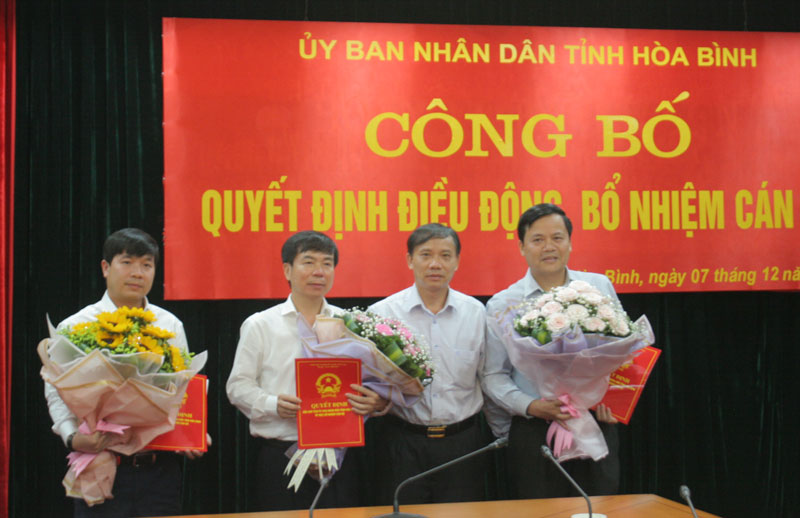
(HBO) – The People’s Committee of Hoa Binh province has announced decisions to appoint new director and deputy director of the provincial Department of Industry and Trade, and deputy director of the provincial Department of Finance.
The provincial People’s Committee
has appointed permanent vice chairman of the provincial Party Committee’s
Inspection Commission Pham Tien Dung as the new director of the Department of
Industry and Trade for a 5-year term. At the same time, deputy director of the
provincial People’s Council’s Commission for Economics and Budget has been
appointed as new deputy director of the department.
Bui Van Thang, Vice Secretary of
the Party Committee and Chairman of the People’s Committee of Lac Son district,
has been appointed as new deputy director of the provincial Department of
Finance.
The decisions came into effect
from December 4, 2018.

Vice
Chairman of the Hoa Binh People’s Committee Bui Van Khanh presents decisions
and flowers to newly-appointed officials.
Vice Chairman of the Hoa Binh
People’s Committee Bui Van Khanh presented the decisions and flowers to
newly-appointed officials and extended congratulations to them on behalf of the
provincial leaders.
The Departments of Industry and
Trade, and Finance are the province’s key bodies, Khanh said. The appointments
take place at the time when the province is reviewing its mid-term performance
and the two bodies are responsible for fulfilling many goals of the province,
and are necessary steps to prepare personnel for the time ahead, he added.
Khanh urged the newly-appointed
officials to promptly keep up with their new work and strive to unite their
staff for the goals to be fully achieved./.
Hoa Binh province is undergoing a dynamic transformation amid Vietnam’s national digital transition. Building on Poliburo’s Resolution No. 57-NQ/TW on breakthroughs in science, technology, innovation, and national digital transformation, the province has rolled out a wide range of practical action plans. A standout initiative is the "Digital Literacy for All” movement, an effort to ensure that no one is left behind in the digital era.
Hoa Binh province is undergoing a dynamic transformation in the wake of the national digital transformation movement. Building on Resolution No. 57-NQ/TW of the Politburo on breakthroughs in science, technology, innovation, and national digital transformation, the province has implemented a wide range of practical action plans. A standout initiative is the "Digital Literacy for All” movement ambitious effort to ensure that no one is left behind in the digital age.
With a spirit of unity and proactive problem-solving, the Party Committee, the government and the people of Dong Lai Commune (Tan Lac District) have made great strides in implementing the resolutions of the 24th Party Congress of the commune for the 2020 - 2025 term. Focusing on leadership and practical actions, the commune has brought the Party’s resolutions into daily life, creating strong impacts and pushing the local development forward.
Amid the nationwide push for digital transformation, young people in Hoa Binh Province are stepping up as dynamic pioneers, applying technology to enhance Youth Union operations and expand the reach of youth-led initiatives. Through creativity and adaptability, Youth Union organizations at all levels have introduced a series of practical solutions, contributing to modern governance and community development.
In recent years, An Nghia commune, located in Lac Son district, has stepped up administrative reform, focusing on improving the quality and efficiency of its single-window service unit for receiving and processing administrative procedures. These improvements have helped create favourable conditions for local residents and organisations to handle administrative procedures, contributing to the commune’s broader socio-economic development.
The Prime Minister-approved master plan to develop the multi-use value of forests ecosystems through 2030, with a vision to 2050, aims to improve the management and sustainable use of forest resources, create jobs, increase incomes, and improve the living standards of ethnic minorities, people in mountainous and remote areas, forest workers and those living near forests.



